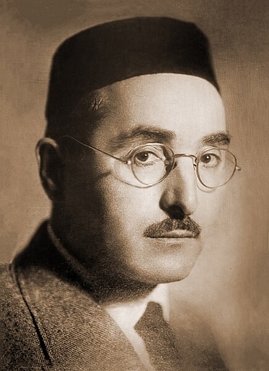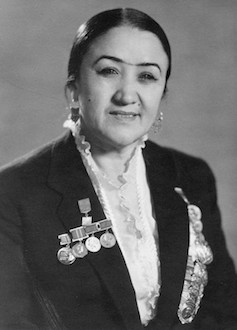
Tolibjon Sodiqov was among the founders of professional music in Uzbekistan, as well as the composer of musical dramas, quartets, operas, and romances.
Suleiman (Solomon) Alexandrovich Yudakov was a Bukharian Jewish composer.
Mukhtar Ashrafovich Ashrafi was a Soviet Uzbek composer. He was awarded the title People's Artist of the USSR in 1951. He became a member of the Communist Party of the Soviet Union in 1941 was awarded the Stalin Prize in 1943 and 1952. He is known as the author of the first Uzbek opera "Buran" and the first Uzbek symphony.

Ural Tansykbaevich Tansykbayev was an Uzbek painter of Kazakh descent. He was named a People's Artist of the USSR and People's Artist of the Uzbek SSR in the category visual art.

Chingiz Akhmarov was an Uzbek muralist, portraitist, miniature painter and teacher. In 1964, he was conferred the title People's Artist of Uzbekistan. He is held in high regard in Uzbekistan and is credited as one of the artists who kept the tradition of Uzbek miniatures alive.
Yoʻldosh Aʼzamov was an Uzbek actor, film director, playwright, screenwriter, and film producer. He is best known for his films Maftuningman (1958) and Oʻtgan kunlar (1967). Maftuningman is the first Uzbek comedy and is considered to be one of the greatest Uzbek films of all time.

Halima Nosirova or Halima Nasyrova was a Soviet and Uzbek singer of Uzbek music. She also started her creative activities as a drama actress in 1927 and was a popular artist of the USSR.

Mukarram Turgunbaeva was an Uzbekistani choreographer and dancer of the Soviet era.

Komil Yashin was a Soviet-Uzbek author, poet, dramatist, screenwriter, and celebrity. Ogonyok magazine described him as "the greatest modern Uzbek playwright".
Mirmuhsin Mirsaidov was a Soviet and Uzbek poet and prose writer.
Galiya Bayazit gizi Izmaylova was an Uzbek and Soviet ballerina of Tatar origin, ballet master, choreographer, teacher, People's Artist of the USSR (1962), laureate of the Stalin Prize II degree (1950).
Razzoq Hamroyev was a Soviet and Uzbek actor, theater director and pedagogue. People's Artist of the USSR (1969). Laureate of the Stalin Prize, second degree (1948).
Ayimkhan Turymbetovna Shamuratova was a Karakalpak theater actress, singer (mezzo-soprano) and public figure. She was the only Karakalpak woman to be awarded the title People's Artist of the USSR (1968).

Sora Abdurahmonovna Eshontoʻrayeva was a Soviet and Uzbek actress. She was one of the first actresses of the Uzbek SSR to gain national prominence. She was described as a "pearl of the Uzbek scene".

Muso Toshmuhammad oʻgʻli, known by the pen name Oybek, was an Uzbek, Soviet writer, poet and translator. He was the People's writer of the Uzbek SSR (1965), Academician of the Academy of Sciences of the Uzbek SSR (1943), winner of the Stalin Prize of the first degree (1946), member of the All-Union Communist Party of Bolsheviks. He was also a deputy of the Supreme Soviet of the USSR of the 5th and 6th convocations.
Roziya Zaripovna Karimova was a Soviet and Uzbek ballet artist, singer, actress, choreographer, performer of Uzbek folk dances, art historian, scholar, and writer. She was awarded the title of People's Artist of the Uzbek SSR in 1950.

Nabi Rahimov was an Uzbek and Soviet stage and film actor and a pedagogue. He received many awards and accolades for his work, including People's Artist of the Uzbek SSR (1950), Order of Lenin (1959), People's Artist of the USSR, (1966), USSR State Prize, (1967), and the Order of Outstanding Merit (2004).
Olim Xoʻjayev was a celebrated Uzbek stage and movie actor. Over a career that spanning nearly five decades, Xoʻjayev received numerous accolades. Some of his most notable roles in theater include Hamlet and Othello in Soviet productions of Shakespeare's plays and the role of Hamza Hakimzade Niyazi in the 1960 film Hamza directed by Zagid Sabitov.
Yunus Rajabiy was a Soviet-Uzbek composer, instrumentalist, folklorist, academic, and leader of Uzbek music groups. In addition to composing much celebrated music, he systematically collected, documented, and recorded many Uzbek songs, preserving songs from collective memory.
Sobir Abdullayev, known by the name Sobir Abdulla, was an Uzbek-Soviet writer, poet, playwright, and literary translator. Abdulla received many prestigious awards for his works, including the State Hamza Prize and the titles Honored Artist of the Uzbek SSR and the People's Poet of the Uzbek SSR.









